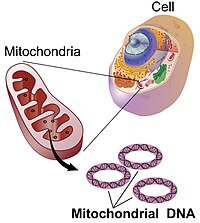
Photo from wikipedia
Gastrointestinal cancer (GIC) is a worldwide public health problem with a high mortality rate. Mitochondrial DNA (mtDNA) mutations in the displacement loop (D‑loop) region are quite common in various types… Click to show full abstract
Gastrointestinal cancer (GIC) is a worldwide public health problem with a high mortality rate. Mitochondrial DNA (mtDNA) mutations in the displacement loop (D‑loop) region are quite common in various types of primary human cancers; however, their role in the pathogenesis of GIC is controversial. In the present study, tumor and para‑tumor tissues were selected from 18 patients with gastric cancer (GC), 21 patients with colon cancer (CC) and 30 patients with rectal cancer (RC). The mtDNA D‑loop was analyzed by sequencing and reverse transcription‑quantitative polymerase chain reaction. Furthermore, DNA oxidative damage and DNA repair functioning were detected by immunohistochemistry. The results demonstrated that increased mtDNA deletion was not evident in GIC; however, significant DNA oxidative damage was significant in RC by detecting 8‑hydroxyguanine expression. In addition, over‑activated DNA repair was identified in CC and RC through the detection of 8‑oxo‑20‑deoxyguanosine glycosylase 1 expression. The mtDNA D‑loop had a specific mutation hotspot region, and the level of mtDNA D‑loop mutations was correlated with the progression of the GIC. The mutations of the mtDNA D‑loop were primarily homoplasmic in GIC and often transitioned at pyrimidine sites. Mitochondrial microsatellite instability, including the formation of poly‑cytidine stretches, was common in GIC. These results demonstrate the occurrence of mtDNA D‑loop mutations in GIC in Chinese patients and support the correlation of these mutations with carcinoma progression. Over‑activated DNA repair function possibly repairs the GIC mtDNA lesions.
Journal Title: Oncology reports
Year Published: 2018
Link to full text (if available)
Share on Social Media: Sign Up to like & get
recommendations!